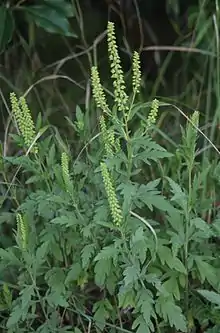Ambrosia psilostachya
Ambrosia psilostachya is a species of ragweed known by the common names Cuman ragweed and perennial ragweed,[3] and western ragweed.
| Ambrosia psilostachya | |
|---|---|
 | |
| Scientific classification | |
| Kingdom: | Plantae |
| Clade: | Tracheophytes |
| Clade: | Angiosperms |
| Clade: | Eudicots |
| Clade: | Asterids |
| Order: | Asterales |
| Family: | Asteraceae |
| Genus: | Ambrosia |
| Species: | A. psilostachya |
| Binomial name | |
| Ambrosia psilostachya | |
| Synonyms[1] | |
| |
Distribution and habitat
The plant is widespread across much of North America (United States, Canada, and northern Mexico).[4] It is also naturalized in parts of Europe, Asia, Australia, and South America.[5] It is a common plant in many habitat types, including disturbed areas such as roadsides.[6][7][8][9][10]
Description
Ambrosia psilostachya is an erect perennial herb growing a slender, branching, straw-colored stem to a maximum height near two meters, but more often remaining under one meter tall. Leaves are up to 12 centimeters long and vary in shape from lance-shaped to nearly oval, and they are divided into many narrow, pointed lobes. The stem and leaves are hairy.[6]
The top of the stem is occupied by an inflorescence which is usually a spike. The species is monoecious, and the inflorescence is composed of staminate (male) flower heads with the pistillate heads located below and in the axils of leaves.[6] This bloom period is from June through November.
The pistillate heads yield fruits which are achenes located within oval-shaped greenish-brown burs about half a centimeter long. The burs are hairy and sometimes spiny. The plant reproduces by seed and by sprouting up from a creeping rhizome-like root system.[11]
Medicinal uses
This plant had a number of medicinal uses among several different Native American tribes, including the Cheyenne, Kumeyaay (Diegueno), and Kiowa people.[12]
Chemistry
Ambrosia psilostachya contains a group of phytochemicals called psilostachyins.[13]
References
- The Plant List Ambrosia psilostachya DC.
- The International Plant Names Index
- "BSBI List 2007". Botanical Society of Britain and Ireland. Archived from the original (xls) on 2015-01-25. Retrieved 2014-10-17.
- Biota of North America Program 2104 county distribution map
- United States Department of Agriculture Plants Profile . accessed 2.14.2013
- Flora of North America Vol. 21 Page 18 Ambrosia psilostachya de Candolle in A. P. de Candolle and A. L. P. P. de Candolle
- Flora of China Vol. 20-21 Page 877 裸穗豚草 luo sui tun cao Ambrosia psilostachya Candolle
- Tropicos, specimen listing for Ambrosia psilostachya DC
- Altervista Flora Italiana, Ambrosia con spighe rade, Ambrosia psilostachya DC. includes photos and European distribution map
- Atlas of Living Australia, Ambrosia psilostachya DC. Perennial Ragweed
- Neill, Robert L.; Rice, Elroy L. (October 1971). "Possible Role of Ambrosia psilostachya on Pattern and Succession in Old-Fields". American Midland Naturalist. 86 (2): 344–57. doi:10.2307/2423628. JSTOR 2423628.
- University of Michigan at Dearborn: Native American Ethnobotany of Ambrosia psilostachya . accessed 2.14.2013
- Wan, Shiqiang; Yuan, Tong; Bowdish, Sarah; Wallace, Linda; Russell, Scott D.; Luo, Yiqi (2002). "Response of an allergenic species, Ambrosia psilostachya (Asteraceae), to experimental warming and clipping: Implications for public health". American Journal of Botany. 89 (11): 1843–6. doi:10.3732/ajb.89.11.1843. PMID 21665612. S2CID 14548075.